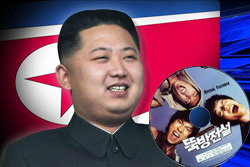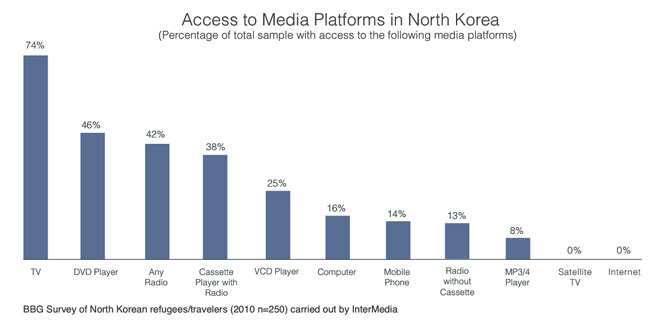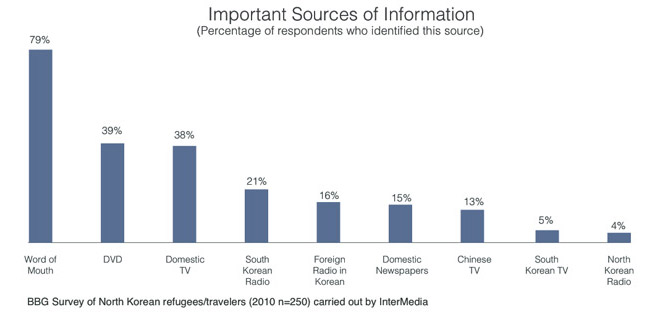Europe's online source of news, data & analysis for professionals involved in packaged media and new delivery technologies

DVDs most common source of information for North Koreans
DVDs are the most common means through which North Koreans access outside media. Nearly half of the respondents - North Koreans defectors and others - from 2010 and 2011 surveys and interviews collated by consultancy group InterMedia reported having watched foreign DVDs while in their home country. The number was 20% in 2008. While foreign radio listening remain largely the purview of more experienced outside news consumers, foreign DVDs are viewed by much broader audiences in North Korea.
In the best documented study to date on the media landscape of this notoriously secretive country, InterMedia's A Quiet Opening: North Koreans in a Changing Media Environment reveals that foreign DVD watching has come to be viewed by many citizens as normal behavior rather than exceptional or abhorrent. Many North Koreans no longer feel the need to conceal the behavior from those they trust; they watched the DVD with others - either friends or family members.
While South Korean and many other foreign DVDs are illegal and serious punishment can be imposed on those caught viewing them, Nat Kretchun and Jane Kim, the authors of the study, point out that DVD players are not illegal and there are DVDs that can be legally viewed in North Korea. So, it is not dangerous to have the machine, but simply the content, which is relatively easier to hide. Therefore, bans on foreign films are nearly impossible to enforce.
InterMedia spotted at the Kangdong market in Pyongyangin in July 2012 DVD players selling for $13 and DVD discs for $0.50 (a 29in TV and a laptop PC sold for $300, a MP3 player for $8).

Foreign DVDs are traded at least as often as they are purchased, and because DVDs have permanent and limited content, they are often shared between friends and family members. DVD dealers are often those with some degree of protection from punishment, such as well-connected elites or wealthy traders. For these individuals the profit from sales is worth the risk.
The report notes the important role that ethnic Chinese living in North Korea and ethnic Koreans living in China play in circulating prohibited goods, particularly DVDs.
Some South Korean and international groups are making attempts to send documentaries and other forms of news content into North Korea via DVD. However, the report observes that only one respondent in their 2010 survey had seen a documentary in North Korea. "The vast majority of the DVDs circulating in North Korea contain entertainment content such as movies or soap operas. South Korean dramas and films were by far the most commonly viewed foreign DVDs, followed by Chinese then Western films and dramas."
Because South Korean content is not made with North Koreans as the main target and have much higher production value, DVDs give many North Koreans their first and most credible glance of the outside world, particularly South Korea.
"North Koreans are well-practiced consumers of heavy-handed propaganda and the absence of such propaganda in South Korean dramas increases their credibility in the minds of many North Korean viewers, note Nat Kretchun and Jane Kim, the authors of the study. "The sophistication of North Korean viewers when it came to identifying propaganda was clear in many interviewees' comments [...] As information about South Korea has spread, the North Korean government backed away from its stance that South Korea was economically worse off than North Korea, as it was unable to sustain that claim in the presence of clear evidence of South Korean economic prosperity."
The Korean Central News Agency's favorite phrase may very well be "field guidance." The words seem to be shorthand for North Korean leader Kim Jong Il touring relatively mundane places with an entourage and offering quirky praise and advice. Already this month Kim has extolled the virtues of a wading pool in raising children to be "pillars of the country" and exclaimed that a meat shop enabled customers to "ask for different kinds of meat they like" (no mention of the country's desperate need for food aid).

In September 20122, North Korea's leader Kim Jong Il inaugurated a newly-built DVD factory. According to the Korean Central News Agency, Kim expressed "great expectation and belief that the officials, workers and technicians of the company would perform fresh miracles and feats in the production and distribution of cultural media. He underlined the need to have DVDs recorded not only with literary and art works, but with reminiscences of President Kim Il Sung."
Story filed 12.02.13




















